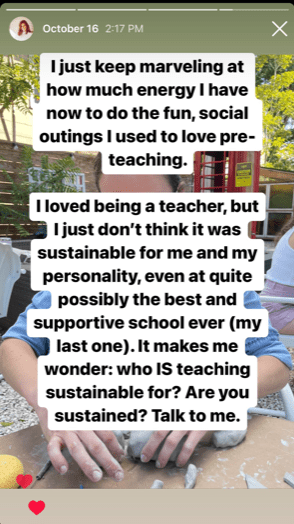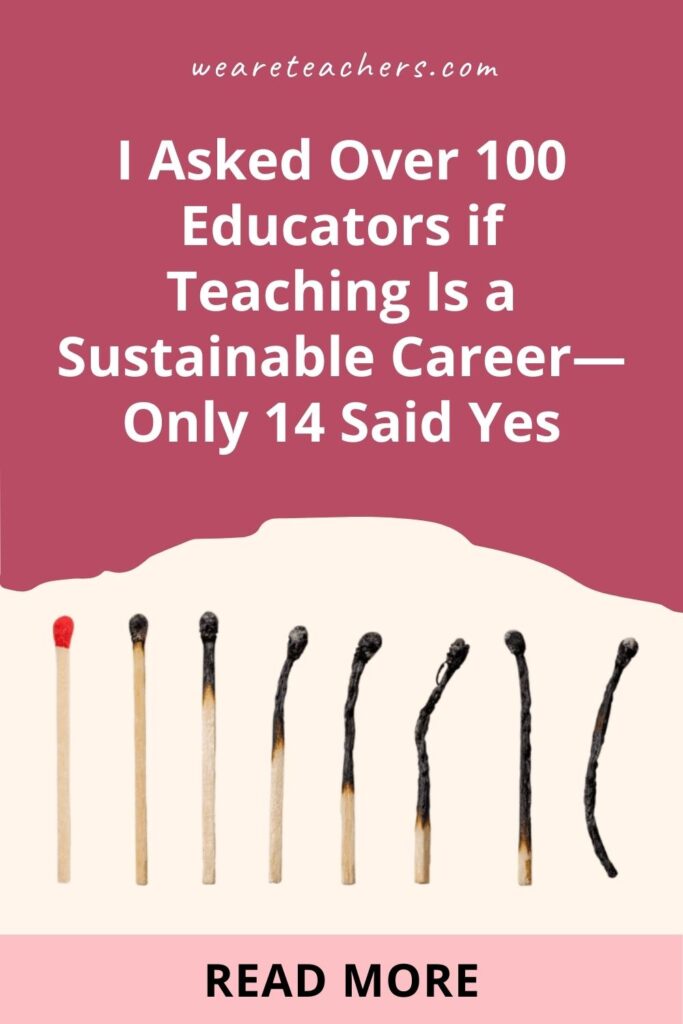Last Saturday, I met up with two close friends for an outdoor pottery workshop at a local studio. We made candlesticks from ceramic clay, downed iced coffee, and chatted about our lives and kids. We stayed until the very end of the workshop, relishing each other’s company and the cool-for-Houston weather (even if the humidity was outrageous).
It wasn’t until I got home that I realized I haven’t felt that way—energized, relaxed, and fully enjoying a social outing—in years. Over a decade, maybe. I’m not saying I haven’t had fun or enjoyed other people in that time. I just haven’t done so without being exhausted afterward or thinking on some level about work.
You see, I left teaching after last year. It’s a long story, but suffice it to say that it was the perfect storm of COVID fatigue, having a baby, and a couple of jackhammer parents. I loved teaching and came from quite possibly the best school, team, and administrators. But it didn’t matter. Teaching just wasn’t sustainable for me.
I posted these feelings on my Instagram story with the question, “Who IS teaching sustainable for?”

I didn’t expect the response I got. Over the next few days, answers poured in from 110 teachers, each with a thoughtful and heartfelt explanation. Here’s what I learned:
Thirteen percent of the teachers I spoke to feel that they could keep teaching as a career. The remaining 87% anticipate a burnout in the next 3-5 years.
The Teachers Who Said Yes
None of the teachers who said teaching is sustainable did so without an explanation clarifying why. It’s clear they know that teaching is not sustainable across the board, and the vast majority at one time had experienced that realization earlier in their careers.
Here’s the most common things I heard that helped make teaching a sustainable career for them:
- Reduced workload. Some reduced their hours to part-time, while others changed to a different role or switched to a smaller school.
- Supportive administrators. Most had to switch schools to find this, FYI.
- Setting firm boundaries to protect home life, mostly saying no to the expectation to overcommit.
- Financial security from partner or other source of income. With this, they can afford to seek quality therapy, take care of themselves, and hire help for tasks that were previously overwhelming.
The Teachers Who Said No
Predictably, the teachers who said no talked about not having the supports in place that their counterparts described. They did not find teaching a sustainable career because of:
- Teaching’s direct and negative impact on health, both mental and physical (with mental often leading to physical). Multiple teachers mentioned the stress/anxiety of school shootings.
- Unsupportive administrators. Leaders can make or break a teacher’s experience.
- Financial insecurity. You simply cannot support a family on a teacher’s salary, let alone retire comfortably or build generational wealth. “Teacher salaries are determined with the expectation that they take on multiple jobs or marry rich, period,” one teacher told me.
- Strains on relationship with family/partner, due to the time and energy that teaching demands and the resulting stress it causes.
I know these findings are dire. But here’s the good news: Even if pundits and politicians and talking heads are all baffled by the teacher shortage, the answer is simple. …
Money. But not in the way we’ve been thinking of school funding.
Money to pay teachers more (and hire more of them), and also hire critical experts to fill roles that meet students’ other needs. Money that attracts the brightest to the profession, raising the level of respect from “anyone can be a teacher” to a truly selective, lucrative, and honorable career. With smaller classes, systems of support, and teachers who can take care of themselves, think of what schools could look like. Think of what generations of kids taught in those schools could look like.
Now whether we’re a country who’s willing to listen to teachers and pay more in taxes to accomplish this, that remains to be seen.
So, back to my original question: Is teaching sustainable?
For some it is, but only with supportive administrators, a reasonable workload, careful work-life boundaries, and financial security brought about by something other than teaching.
In other words: not for most people. But it could be.
Do you think teaching is a sustainable career? Let us know in the comments.
Looking for more articles like this? Subscribe to our newsletters.


